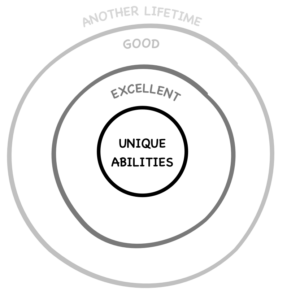Done with writing?
My teachers noticed my aptitude for mathematics as early as elementary school. From there on, I was given free rein to indulge my taste for puzzles, geometrical constructions, and mathematics problems. I was also excused somewhat from the rigor of other subjects. Language Arts was one of those subjects. I always had ideas for my homework essays in Language Arts; I just didn’t have the inclination to make an effort to put the ideas into a proper form. My Language Arts high school teacher used to say, “good enough,” and give me an excellent mark on writings that, though original, were executed sloppily. No harm done, I thought at the time. As soon as I graduated from high school, I’d be forever done with this tedious process of writing.
Going through College
There were no general education requirements at my undergraduate university. In Bulgaria, everyone completes their gen eds in high school, so college is about your specialty. I was thrilled! No more writing!
That notion was quickly dispelled on the first day of classes when I discovered that I had to write a lab report every week. And though lab reports are quite different from the usual writing assignments that you will see in the languages or humanities, it nevertheless was a writing assignment. Then, I had to write my application essays for admission to graduate school, scholarship essays, and various research papers. In graduate school, I had a master’s thesis, scientific articles, and eventually a Ph.D. dissertation to complete. They all required a significant amount of time and effort dedicated to putting things in writing.
Writing on behalf of others.
I chose to teach physics at a Community College for very specific purposes. No research or bringing in funding was required. I was expected to teach introductory physics courses and help with administrative duties. No writing grant proposals, articles, or other papers. This time, I thought, I finally got rid of all the writing!
Well, that freedom from writing lasted barely one semester, and then my students approached me to write letters of recommendation for them. If I thought writing was tedious before, now it became overwhelming. The burden and responsibility to write on someone else’s behalf felt excruciating. Now, I had to write not only for myself but also to further my student’s academic progress. And when ten years into my tenure at the College, I was tasked by the Dean to write a review of the state of the physics program, I gave up. It took me only twenty years to realize that there was no running away from writing. I might as well embrace it. Life was about communicating with others, and writing was a significant component of that communication.
Which brought me back to thinking about my high school. If I had to do it all over again, I would tell my younger self to choose a better, more strict Language Arts teacher and push through the pain of those early high school years. Even though my grades might have suffered, I would still have followed the same identical career in the sciences but with a better, more solid foundation in writing.
It is funny how in the long run, the nice teachers that let us get away with minimum effort take on a completely different light. They certainly do us no favors. The strict teachers who demanded excellence appear to be the ones who thought highly of us. They knew we could do better and expected us to rise to their demands. And they certainly taught us the skill to do so.

Life is about communicating with others, and writing is a major component of that communication.







